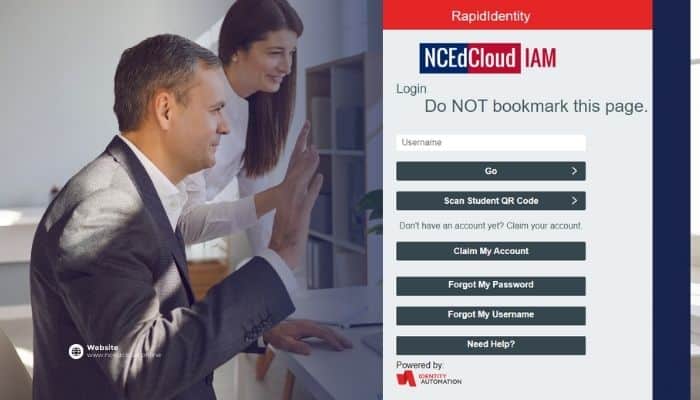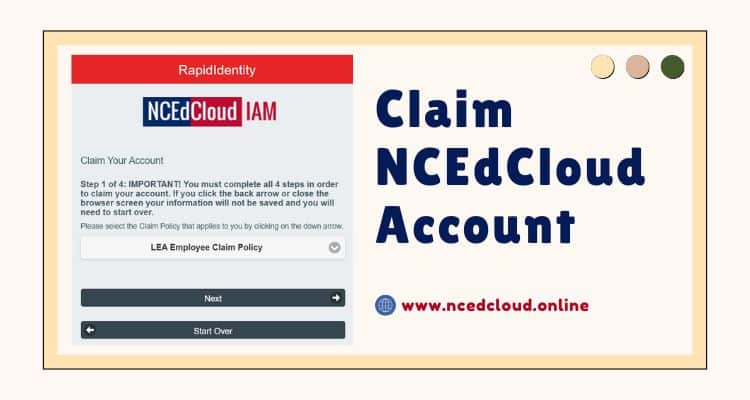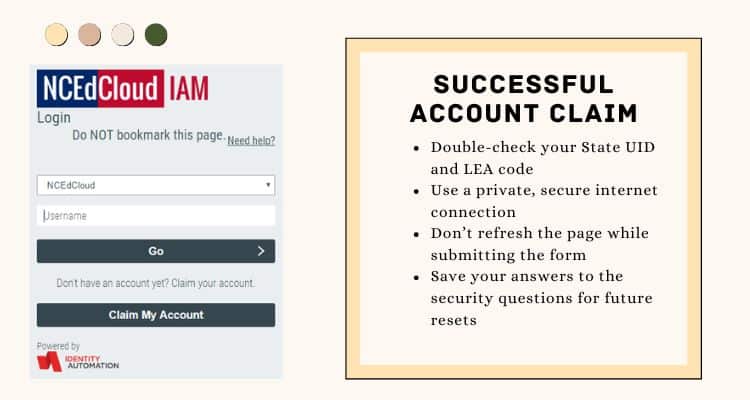Claiming your NCEdCloud account is the process of activating your login credentials for the first time. If you’re a new student (grades 6–12), teacher, or school employee in North Carolina, you’ll need to Claim NCEdCloud Account before accessing tools like PowerSchool, Canvas, and Schoolnet.
📌 Note: K–5 students do not need to claim their accounts. They receive login credentials directly from teachers.

Who Needs to Claim NCEdCloud Account?
You should claim your NCEdCloud account if you are:
- A new student in grade 6–12
- A new teacher or school staff member
- A transferred user with a new State UID
- Any user who has never logged in before
Information You’ll Need to Claim NCEdCloud Account
Before you begin, make sure you have:
- Your State UID Number (also known as your PowerSchool Student ID)
- Your birthdate (MM/DD/YYYY format)
- Your LEA Code (assigned to your school district)
- Access to the official NCEdCloud portal
If you don’t know your UID or LEA code, ask your teacher, school office, or IT department.
Step-by-Step: How to Claim NCEdCloud Account
Follow these simple steps to claim your account through the official NCEdCloud IAM portal.

Step 1: Visit the Claim Portal
Go to: 👉 https://my.ncedcloud.org
Click on the “Claim My Account” link located below the login box.
Step 2: Select Your Claim Policy
You’ll be presented with two options:
- Student Claim Policy (for grades 6–12)
- LEA Employee Claim Policy (for teachers and staff)
Choose the appropriate one based on your role and click “Next”.
Step 3: Enter Your Details
You’ll need to fill in the following information:
- State UID Number
- Birthdate
- LEA Code
- Grade Level (for students)
Click “Next” to proceed.
Step 4: Set Up Password & Security Questions
You’ll be asked to:
- Create a strong password that meets NCEdCloud security requirements
(Minimum 8 characters, including uppercase, lowercase, and number) - Choose and answer security questions for future password resets
Click “Save” once done.
Step 5: Finish & Log In
Once you’ve successfully completed the setup:
- You’ll see a message confirming your account is claimed
- Go back to my.ncedcloud.org and log in with your new credentials
Password Requirements
Your new password must:
| Requirement | Details |
|---|---|
| Minimum length | 8 characters |
| Must include | One uppercase, one lowercase, one number |
| Avoid | Using your name or UID number |
Tips for a Successful Account Claim
- Double-check your State UID and LEA code
- Use a private, secure internet connection
- Don’t refresh the page while submitting the form
- Save your answers to the security questions for future resets

What If I Can’t Claim My Account?
If you encounter any issues:
| Issue | Solution |
|---|---|
| Incorrect UID or LEA code | Ask your teacher or school office |
| Error during submission | Try again using a different browser |
| Forgot security answers later | Contact school IT administrator |
Mobile Users: Can I Claim My Account via the RapidIdentity App?
At this time, the account claiming process must be completed using a browser (desktop or mobile). The RapidIdentity app is only used after your account is successfully claimed.
Frequently Asked Questions (FAQs)
Do I need to claim my account every year?
No. Once you claim your NCEdCloud account, you use the same credentials unless your UID changes.
What’s my LEA code?
Your LEA code is the district number assigned by the North Carolina Department of Public Instruction. Ask your teacher or media coordinator for it.
What happens if I make a mistake during the claim process?
If you enter incorrect details multiple times, your account may be temporarily locked. Contact your school’s IT help desk for assistance.
Final Words
Claiming your NCEdCloud account is the first step to accessing North Carolina’s digital education tools. Follow the steps in this guide carefully, and you’ll be logged in and learning in no time!
Need more help?
👉 Visit our full NCEdCloud Help Center for more guides on login issues, password resets, and using MFA.